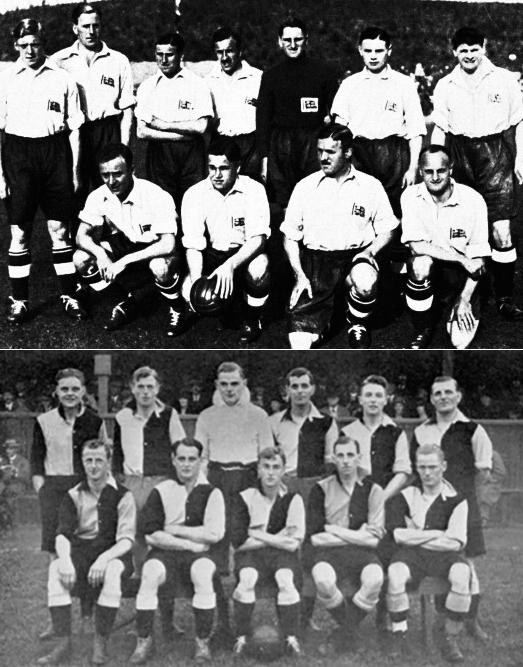The Goldsmiths footballer who refused to give the Nazi salute at the 1936 Berlin Olympics
Primary page content
Goldsmiths graduate Bertram Arthur Clements (1913-2000) was one of the university’s most successful soccer players.

Top: Great Britain's 1936 football team. Below: Casuals FC, 1936
He won an FA Amateur Cup winners' medal in 1936 and represented Great Britain as a centre forward during the notorious Berlin Olympics, scoring the opening goal in Great Britain's 5-4 quarter-final defeat to Poland.
Unlike the professional England team who became infamous for giving the Nazi Salute in Berlin two years later, Bertram and his amateur team-mates pointedly refused to give the ‘Sieg Heil!’ in the two games they played during the tournament. It is one of the unknown stories of the 'Jesse Owens' Olympics, and the team’s refusal provoked a diplomatic row.
Bertram trained as a teacher at Goldsmiths between 1933 and 1935, when the college was famous for being secular and welcoming of Jewish students excluded from Christian denominated colleges at the beginning of the 20th century.
Bertram played for the great amateur team Casuals FC in 1936. They later amalgamated to form the current Corinthian Casuals in 1939. He played centre forward for the Casuals when they won the 1936 FA Amateur Cup 2-0 against Ilford at West Ham United's ground, then went on to play for Barking FC before and after the Second World War.
He scored 63 goals for Barking including seven hat tricks and won three cup competitions with Barking in the seasons '37-39 - The South Essex Charity Cup, Addenbrooke Hospital Cup (Cambridge) and East Anglian Cup.
Bertram and the 1936 Berlin Olympic Games
Bertram was one of 208 Great Britain athletes at the 1936 Berlin Summer Games, and paraded in the opening ceremony on August 1st, 1936 and the closing ceremony two weeks later.
Bertram was a substitute in Great Britain’s underwhelming defeat of China in the first round on August 6th, 1936 at Berlin's Mommsenstadion in front of 8,000 spectators.
The quarter final against Poland was played two days later before a crowd of 6,000 at Berlin's Poststadion ground. Bertram Clements gave Great Britain the lead with the first goal after 26 minutes.
But Poland replied with 5 goals. Their player Wodarz got a hat trick. A late Great Britain rally at the end of the game pulled the score back to 5-4 but it was not enough to draw level and go into extra-time.
The match was controversial for a number of other reasons. Poland had dropped their best player, Ernst Wilimowski, because of his penchant for drinking vodka to excess - even while on the pitch.
The crowd became hostile when GB got back into the game with what would now be described euphemistically as 'hard tackling.'
The Glaswegian defender John Gardiner (from Queen's Park) did what the Manchester Guardian reported as some 'hefty charging' and most of the booing was provoked when the Guardian further reported that Gardiner had 'bowled over God.' The paper meant the Polish forward Hubert Gad.
The British team were instructed to comply with a propagandist set-piece meeting with Adolf Hitler at the Berchtesgaden between the China and Poland games.
They were escorted there by SS guards in black suits and did not enjoy shaking Hitler's hand. Bertram's player-colleague Daniel Pettit (Cambridge University) later told the author Steve Manery “I've been washing my hand ever since.”
The Great Britain players created a diplomatic incident by pointedly refusing instructions to give the Nazi salute before their matches.
The pressure on the professional English team visiting Berlin in 1938 was so great newsreel footage shows them giving the Nazi regime the respect denied by the amateur players two years previously.
Bertram's Great Britain captain was his fellow Casuals player, Bernard Joy, who was the last amateur player to win a cap in the professional English team in a match against Belgium. He joined Arsenal and in later life had a successful career as journalist for the Evening Standard.